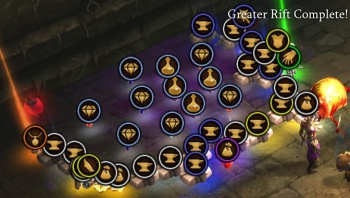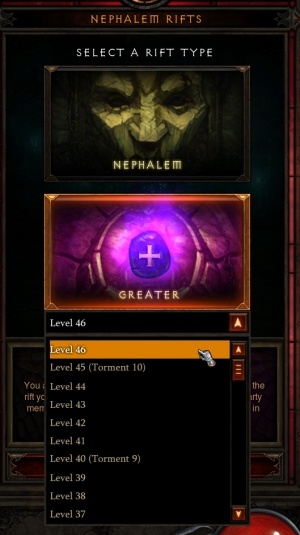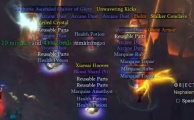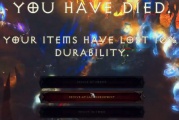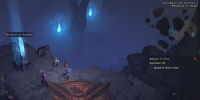Greater Rifts (GRs or GRifts), initially known as Tiered Rifts are a special timed type of Nephalem Rift, added in Patch 2.1 and modified repeatedly since then. Grifts are designed to provide an end game play mode with progressively increasing difficultly, plus rewards to match. They are Diablo 3's ladder challenge, with Realm-wide rankings recording the best times for every class and 2-4 player parties.
Like normal Nephalem Rifts, Greater Rifts have randomly generated tilesets, layouts, and monsters. Grifts however have higher monster density, and there are no item or gold drops, no chests, and very few destructibles. Greater Rifts are all about killing speed and tactics, without item drops or gold to distract players. Elite enemies do not drop items, but do drop several purple Progress Orbs, which are worth about 1% completion when picked up. All the item rewards come from the Greater Rift Guardian who spawns once players kill enough enemies to reach 100% completion. At that point all other monsters vanish from the level. Patch 2.5 made it so Guardians will teleport to the player if they move more than 2 or 3 screens out of sight. This is helpful for players trying to finish the Grift quickly for a record time, but can be deadly for players who are low on health and need some space for safety.
Greater Rifts offer far more incremental difficulty levels than the normal game. Greater Rifts start at Rank 1, equivalent to Easy mode, and increase infinitely, with the monster hit points, damage, experience value, etc, scaling up by a set amount per GR level. Torment 1 = GR10, Torment 6 = GR25, and Torment 10 = GR45. (Full equivalency list below). While Greater Rifts maxed out at 100 in their initial patch testing, there is no upper limit since GRs scale up infinitely, and parties of players were first able to exceed GR100 in Patch 2.5.
Greater Rift facts:
- Greater Rifts require Rift Keys to enter, which can only be dropped by Guardians in regular Rifts.
- Legendary Gems are only dropped by Greater Rift Guardians, and can only be upgraded via Urshi when a Grift is finished in under 15 minutes.
- There are no regular shrines in Grifts, just Pylons which are more powerful than Shrines, but only last for 30 seconds. Only one, at most, of each type of Pylon can be found per Grift.
- Treasure Goblins are not found in Grifts. (Early on the PTR they were present, and would drop Progress Orbs when killed.)
- No loot or gold drops in Grifts, and there are no chests and very few destructibles.
- There is no maximum level Grift, as the monster hit points, damage, etc, scale up infinitely with higher GRs. Monster exp also increases with the GRift, and farming high level grifts is worth vastly more experience than playing on even Torment 10. (Especially in multiplayer parties.)
- Respecs and gear changes are not permitted during a Grift, though Paragon Points can be reallocated. (In early PTR testing players could return to town and change gear, but this is no longer permitted.)
- Greater Rifts are found only in Adventure Mode and as such are only in Reaper of Souls or the console Ultimate Evil Edition.
Difficulty
Greater Rifts do not use the standard Diablo 3 difficulty system and the difficulty of a game has no effect on the difficulty of the Grift. Characters earn the right to enter higher level Greater Rifts by completing Rifts within fifteen minutes -- faster clears will allow players to select a Grift of more than one level higher.
It's impossible to directly compare difficulty levels[1] due to vagaries in monster spawn and density, but the approximate levels were initially estimated by PTR testers[2] [3] and later confirmed by the developers and displayed on the GR selection screen.
Greater Rift Level = Difficulty
- Greater Rift Level 1 = Hard
- Greater Rift Level 4 = Expert
- Greater Rift Level 7 = Master
- Greater Rift Level 10 = Torment 1
- Greater Rift Level 13 = Torment 2
- Greater Rift Level 16 = Torment 3
- Greater Rift Level 19 = Torment 4
- Greater Rift Level 22 = Torment 5
- Greater Rift Level 25 = Torment 6
- Greater Rift Level 30 = Torment 7 (Torment 7-10 added in Patch 2.4.)
- Greater Rift Level 35 = Torment 8
- Greater Rift Level 40 = Torment 9
- Greater Rift Level 45 = Torment 10
- Greater Rift Level 46+ = higher than Torment 10.
- Presumably the same rate of scaling continues, and thus if there were Torments higher than 10, they would be roughly GR50 = Torment 11, GR55 = Torment 12, etc, with GR100 = Torment 21.
GR30 was about the limit for a very well-equipped (softcore) character entering the Patch 2.1 testing on the PTR. Shortly after Patch 2.1 players with improved gear began to clear up through GR35 routinely, with the first groups into the low 40s. As gear and strategy improved, higher and higher levels were reached in each subsequent patch. Patch 2.5 in early 2016 brought the first groups to clear GR100[1] (Some players had hit GR100 in early Patch 2.1 PTR testing, but only by using various item exploits that were soon patched out.)
Accessing Greater Rifts
The series of steps to enter Greater Rifts has been greatly simplified in patches since the feature launched. Patch 2.4 removed the deeply unpopular Realm of Trials and the ranks on Greater Rift keys. As of Patch 2.5, characters need merely find a Greater Rift Key from a Rift Guardian and they can use it to enter a Greater Rift, selecting a GR level based on their highest GRift previously cleared.
This is a much easier system than the initial one, but it makes gearing up and Legendary Gem acquisition slower early in a season, since players have to find a Rift Key for each Grift, rather than just finding one and then running 10 or more Grifts with that one key, via "slow rolling".
Progress Bar and Rift Speed
The progress bar in a Greater Rift is electric purple in color, with the progress compared to an hourglass showing how far above (or below) the player is compared to the 15 minute time limit. The initial design did not incorporate the bright purple coloration, and can be seen in the images here.
When players are battling through a Rift that's just at the limit of their killing power, they will often see their progress drop behind the timer bar when killing trash mobs, and then jump ahead when they kill the more valuable Elites and claim their Progress Orbs. Since the Rift Guardian appears last and has very high hit points, players must be some distance ahead of the end time on the progress bar to have time to finish the Guardian as well, and most Rifts "fail" while players are locked in fevered battle with the GRG. (Guardian hit points were greatly reduced in Patch 2.4, since players without good single target damage were often spending as long fighting the Guardian as clearing the entire rest of the Grift.)
As of Patch 2.4, players must complete the Rift and kill the Guardian within 15m in order for Urshi to give them the option of upgrading their Legendary Gems. Completions at 15m or longer do not offer any reward from Urshi, though the Greater Rift Guardian still drops items and materials as normal.
Rewards
All gold and item rewards in Greater Rifts are granted by the Greater Rift Guardian who does not spawn until the progress bar reaches 100%. (Even if players run well past the 15 minute timer, the Grift must still be cleared to 100% before the Guardian will appear.)
Greater Rift Guardians drop the best quality loot in the game, and players moving into higher Grifts ("higher" varies between patches and continually increases due to power creep) will generally see 3-6 legendary items per Guardian, plus stacks of materials and gold. Grift Guardians are always good kills though, and even the lowest level Greater Rift Guardians have good odds to drop at least 1 or 2 legendary items. Also, even GR1 Guardians can drop the special class set items that normally do not spawn below Torment 1 (equivalent to GR10.)
No gold or items drop from normal monsters or Elites in Grifts, and there are no chests or clickables (loose floor tiles, dead bodies, armor/weapon racks, etc) and very few destructibles in Grifts. (This functions to present the Grift as a fast killing challenge, and also removes the powerful buffs from some items that trigger from gold pickup, opening chests, etc.) Monster award Progress on the Bar, and Elites drop purple Progress Orbs worth about 1% Progress. The item rewards come only from the Greater Rift Guardian.
The real reward most players play Greater Rifts for, aside from huge experience gains, is the opportunity to upgrade Legendary Gems via Urshi, who appears only after the Greater Rift Guardian has been defeated.
Experience
Greater Rifts are potentially a huge source of experience. Monsters killed on GR46 are worth more experience than kills on Torment 10 (equivalent to GR45) and monster experience value skyrockets as players move up into much higher Grifts.
Orek awards a substantial experience and gold reward for players who complete a Rift within 15 minutes. This value is shown in a pop up window that appears after completing the Grift.
Grift Evolution
The initial Greater Rift system made it cumbersome to play up to the appropriate difficulty of Greater Rift. In those days all Greater Rift keys had a GR#, and players needed a Grift key of the correct number to enter that level of GRift. However, players could only find GR1 keys from Rift Guardians, and thus had to enter Greater Rift level 1, which was equivalent to Easy. Any player with decent equipment would thus zoom through the entire GR1 in just a couple of minutes, upgrade the key the maximum possible 10 levels, to GR11, and repeat. Well-geared players were soon progressing something like GR1 > GR11 > GR21 > GR28 > GR34, etc, before they reached a Grift level that would challenge them at their highest level of performance.
This could be very frustrating for players who wanted to push their best score, but had to play through numerous very easy, and then a series of slightly higher GRifts just to get back to a chance at their new high score.
Realm of Trials
To fix the annoying requirement that players work each GRK up from rank 1, Blizzard introduced the Realm of Trials in Patch 2.3. At that point the overall sequence of events went something like this:
- Find a Keystone of Trials, which can be dropped by any Nephalem Rift Guardian on Torment 1 or higher.
- Use the Keystone of Trials at the Nephalem Obelisk in town to enter the Realm of Trials.
- In the Trial fight waves of enemies, killing as many as possible to earn a higher level Greater Rift Key.
- Use your Greater Rift Key to open a Greater Rift of that level.
- Clear the Grift and kill the Guardian within 15m to earn the option of upgrading to a higher level Grift Key.
- GRKs are upgraded via Urshi, and a higher level GRK will be created based on how fast the rift was cleared.
- If players chose not to upgrade their Grift Key, they could instead take 3 chances to upgrade a Legendary Gem.
- Use the new GRK to enter a Grift of that level, and repeat until you can not finish a Grift in time.
The new addition in Patch 2.3 was the Realm of Trails. This was a sort of "tower defense" style mini-game where players entered a small static area and fought off endless "waves" of enemies, of increasing difficulty/hit points, until they failed by not entirely clearing a wave within the 20 second time limit.
The highest wave completed earned players a GRift key of a level slightly lower than that wave. For instance, if the highest Wave cleared in a particular Realm of Trials was 35:
- Wave 35, 1 player: GRK31
- Wave 35, 2 players: GRK30
- Wave 35, 3 players: GRK29
- Wave 35, 4 players: GRK28
Waves increased in difficult, and players jumped up more waves based on how fast they defeated each wave. The biggest increase possible was 6 waves, so a player with a maximum capability of about GR45 would often see a progression of something like: Wave 1, 7, 13, 19, 25, 33, 37, 40, 42, 43, 44... which they failed to kill. They'd thus earn a Greater Rift key based on the last wave they did clear, 43.
Once players had the key, they still had to enter a Greater Rift of that level, which was seldom their highest level of GRift. Thus the entire sequence went something like this, for a hypothetical solo player with a GR50 best clear:
- Farm Torment 6 Nephalem Rift for guaranteed Greater Rift Key drop.
- Use GRK to enter Realm of Trials.
- Defeat up to Wave 44, earning a GRK40.
- Enter GR40, defeat it in 7 minutes, upgrade to a GR45 key.
- Enter GR45, defeat it in 10 minutes, upgrade to a GR47 key.
- Enter GR47, defeat it in 12 minutes, upgrade to a GR48 key.
- Enter GR48, defeat it in 13 minutes, upgrade to a GR49 key.
- Enter GR49, defeat it in 15:22, too late!
- Curse a lot while upgrading Legendary Gems.
That's a hypothetical scenario, but you can see the player spent upwards of an hour of play time without even getting a chance to push for their highest possible GRift level, which was their objective from the start. Sure, they would have earned good experience and some legendary item drops from the Rift Guardians, but it was a lot of hoops to leap through to just get back to your highest GR level. And often not even that far.
Thus while the Realm of Trials system provided high level Grift keys much more quickly than forcing players to play through all the Grifts starting at GR1, most players found Realms an unwanted and time-consuming middle step between them and the GRifts they wanted to play.
It was therefore a big fan favorite when Blizzard removed the Realm of Trials in Patch 2.4, replacing it with a system where players simply found non-numbered Greater Rift keys from Nephalem Guardians, and used those to enter any level Greater Rift they had earned the right to enter. Higher levels were unlocked by defeating new record highs, and the values were saved account-wide, rather than being tied to any specific character.
Slow Rolling
A common technique prior to Patch 2.3, when ranks were removed from Greater Rift keys and Urshi could no longer up-rank keys, was to "slow roll" Rifts.
In those days, players who completed a Rift with less than 4:30 to spare could only upgrade their GRK by 1 level. This was exploited by players who wanted to get their Legendary Gems quickly (plus receive big legendary drops from GR Guardians). Thus at the start of Seasons, players would run Nephalem Rifts until they found 1 GR Key, and then head to Greater Rift level 1, which they would intentionally not finish any faster than 11:30. This would grant them a GRK 2, which they could then also "slow roll" by not finishing before 11:30, earning a GRK 3, and so on.
The goal was to accumulate numerous different Legendary Gems as quickly as possible, while also scoring lots of Legendary item drops from the GR Guardians.
Since the low level GRs were very easy, players would usually get to 95% or higher within a few minutes, and would then portal out and run a few Bounties while keeping an eye on the clock, since they had to get back to the Grift, complete it, and spawn the Guardian later than 11:30 but not past 15:00, or else upgrading their Grift Key would not be possible, thus ending their slow roll.
This trick was ended by the Patch 2.3 system changes, and now players must find a GRK from a Rift Guardian for every Grift they wish to create or enter.
Greater Rift Reveal
Blizzard revealed the first details about Greater Rifts in a Patch 2.1 preview blog on June 17, 2014.[4]
...
While Greater Rifts are a type of Nephalem Rift, there are some key differences between the two features. In Greater Rifts:
- You’ll race against a clock to fill a progress bar by accruing monster kills.
- Most monsters do not drop loot; rewards have been completely shifted to the Rift Guardian.
- This removes conflicting pressure from attaining a better time versus picking up all your loot.
- Monsters grant differing amounts of progress for your progress bar; the tougher the monster, the more they fill up your progress bar.
- You cannot resurrect at your corpse or in town while in a Greater Rift -- only at the last checkpoint.
- Note that, currently, if you die in a Greater Rift on a Hardcore character, that death will be permanent.
- You cannot use player banners or the Teleport option if the target player is in a Greater Rift.
- Higher Greater Rifts levels are progressively more difficult.
- This difficulty is separate from the standard difficulty settings (Master, Torment I-VI, etc.)
If you complete a Greater Rift before time expires you’ll advance to the next difficulty level. Should your time be exceptionally good, you might even skip a few levels! If time instead expires, you’ll have reached the end of your current Greater Rift journey and your best results will be posted to the appropriate Leaderboards.
Greater Rift Leaderboards
The top characters and 2-4 player parties during each Season (and non-seasonal characters in the "Era" leaderboards) are ranked on realm-wide Leaderboards, giving bragging rights and epeen to the most dedicated players. Blizzard's initial preview described Leaderboards as such:
Greater Rift leaderboards will be split between both Hardcore and Normal gameplay modes as well as Seasonal and Non-Seasonal characters. To help encourage a variety of play styles and allow you to measure yourself against similar competitors, we’ve also broken up Greater Rift leaderboards into the following categories:
- Solo play for each class (e.g. top players for Barbarian, Demon Hunter, Crusader, etc.)
- 2-Player Groups
- 3-Player Groups
- 4-Player Groups
Media
Screenshots and videos from Greater Rifts.
|
ZiggyD with a very informative video showing his Demon Hunter progressing from L1 up to a L27 Greater Rift in a party. |
Solo Barbarian Greater Rift play from Eisenheim TVfans. |
References
- ↑ Greater Rift Difficulty - Blizzard CM, 04/06/14
- ↑ Greater Rift early feedback - Sidereel via Reddit, 27/06/2014
- ↑ Greater Rift playthrough video - ZiggyD gaming stream, 27/06/2014
- ↑ Greater Rift Reveal - Blizzard Entertainment, 17/06/2014
| Items of Diablo III [e] Item Basics Normal Items Crafting Legendary Armor I Legendary Armor II Legendary Weapons 1h Legendary Weapons 2h Item Sets |
|---|





